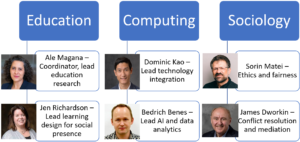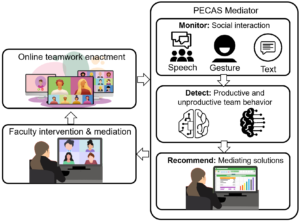Alejandra J. Magana, Dominic Kao, Bedrich Benes, and Jennifer Richardson at Purdue University share more on their most recent NSF-funded project, Productive Online Teamwork Engagement Through Intelligent Mediation (#2113991).
The COVID-19 pandemic required a shift to virtual collaboration across professional and academic contexts. This shift inspired full time faculty members and researchers, Alejandra Magana, Dominic Kao, Bedrich Benes, and Jennifer Richardson, to develop tools that can help foster social presence, facilitate teamwork, and promote engagement in online learning within higher education settings.

Team members, interdisciplinary expertise, and roles
What inspired your project?
The principal investigators (PIs) are faculty members with large class sizes ranging from 80 to 150 students. Being virtual, they experienced challenges in monitoring individual and team dynamics in their courses. Through these experiences they recognized a need for online learning environments that foster both effective teamwork and productive collaboration amongst students. Realizing this issue was a pervasive one institutionally led to the inception of their Research on Emerging Technologies for Teaching and Learning (RETTL) project: Productive Engagement through Collaborative Action and Sociology (PECAS) Mediator. This tool is currently under developmental stages to support course instructors and students in online learning environments through artificial intelligence (AI).
Currently, one of the few ways that instructors can assess overall teamwork and performance is by the quality of team project deliverables at the end of a course. However, these products do not provide information about the quality of the team’s collaborative process. This lack of direct insight into the individual stages of a team project lifecycle makes it nearly impossible for instructors to intervene into and mediate team conflicts in a timely and an appropriate manner. Consequently, the inability to monitor collaboration across disparate virtual spaces makes it difficult for course instructors to guide student teams towards adopting practices that are tailored to their unique behavioral dynamics and ensure team success in collaboration and performance.

Project concept for PECAS Mediator to detect productive and unproductive team behaviors and recommend mediating solutions to faculty.
After observing many instructors struggling with facilitating team building in unfamiliar remote learning environments, Dr. Magana leveraged her expertise in the teamwork literature in order to lead a conflict resolution training mid-semester to better support and facilitate collaboration among her students. With the creation of PECAS Mediator, course instructors will be provided real-time insights, through AI-enabled monitoring, into various forms of engagement that may contribute to overall team performance. This may include alerts on behaviors that may serve as potential flags of unproductive engagement within teams. These alerts allow instructors to provide timely and appropriate mediation and guidance to teams. It also offers an opportunity to further educate course instructors on appropriate ways to handle mediation for various behaviors amongst novice and expert learners within teams.
Actively teaching in higher education gives these researchers first-hand knowledge of students’ experiences and feedback that can be incorporated in the project. However, they remain cautious about incorporating AI into their classes. Some of these concerns include: the potential for bias from or inaccuracy of algorithms, measuring outcomes based on engagement without feedback, and differing webcam quality and fidelity among students. These issues will be examined during the project. They also are concerned about their students’ perceptions of using AI to detect issues during their collaboration. The PIs don’t want students to be uncomfortable with the technology. The PIs emphasized that no personal data would be stored at any point; insights would always be captured at the group level and would never be linked to any individual.
What will be the impact of your project on teaching and learning?
This project provides an opportunity to contribute to the broader learning sciences community. Currently, there is extensive research on teamwork and collaboration, specifically in the context of pedagogical design, but there is limited literature on novice learner team behaviors within higher education settings. Further, the PECAS Mediator project will improve the learning experiences for students and course instructors by assisting faculty with monitoring and mediation, plus, the research will give insights about facilitation to increase productive engagement.

